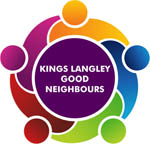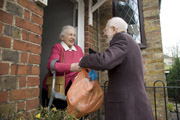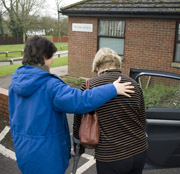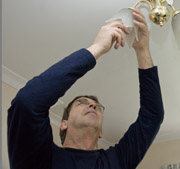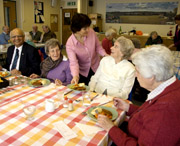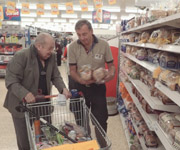Contact us
To contact us, please call our Helpline - 07790 668672 – which is manned 9.00 am - 5.00 pm 7 days a week. A volunteer will either answer your query or refer it within the Association, and you will receive a call back with our reply. Alternatively, please send us an email
Policy Documents
We have put in place a number of policy documents to guide us in the correct procedures to adopt under various circumstances.
Complaints Policy
The Association takes any complaint about its activities very seriously. If you have any cause for dissatisfaction, please, as is convenient or appropriate, contact one of our volunteers, contact our Helpline (07790 668672), e-mail us at kingslangleygna@gmail.com or write to us at c/o 75 Hempstead Road, Kings Langley WD4 8BS. We will need to know the date and time of the incident concerned, the volunteer(s) and any other person(s) involved and the nature of the cause of dissatisfaction. A member of the Association’s Management Committee will contact you, within a week, to confirm the details and to ask for any supplementary information which will help our investigation. Our investigation will be carried out with due regard to sensitivity and confidentiality, but it may be necessary to disclose some details to volunteers or clients who may be asked to contribute.
The Association will seek to reach a conclusion within 3 weeks of us contacting you, and will advise you of its findings and of any actions which it is taking as a result.
Policy for Safeguarding Adults at Risk
INTRODUCTION
Kings Langley Good Neighbours Association (KLGNA) is committed to safeguarding and promoting the welfare of adults at risk, who are involved in any of its activities.
The purpose of this policy is to outline the duty and responsibilities of all persons working on behalf of KLGNA in relation to the protection of adults at risk.
This policy is intended to cover the three main areas where safeguarding is pertinent to KLGNA:
. one-on-one volunteer to client assignments
. regular group activity at a specific location, e.g. Lunch Club
. occasional external events, e.g. an outing for clients
The term ‘adult at risk’ has replaced the previously used ‘vulnerable adult’. See Appendix 1 for a fuller definition of the term, and the legal framework within which this document is set,
KLGNA POLICY RE SAFEGUARDING
Safeguarding Co-ordinator
· KLGNA has appointed a Safeguarding Co-ordinator, to ensure all concerns and enquiries involving adults at risk that arise within KLGNA are dealt with satisfactorily, including referral to the appropriate agency as required. The Safeguarding Co-ordinator acts as an advocate for adults at risk in all KLGNA matters, to ensure that the needs of adults at risk are taken into account.
The Safeguarding Co-ordinator is appointed by the Management Committee for a period of one year and is eligible for reappointment.
· As required, the Safeguarding Co-ordinator will attend training provided through Dacorum Borough Council (DBC), on programmes which have been specifically designed to reflect safeguarding in a volunteering context.
. At least annually the Management Committee arranges for a full Risk Assessment of regular events to be carried out. Within the limitations of what is reasonably practicable, the Management Committee undertakes to respond promptly to any findings of such an assessment.
. When an event involving a number of clients is taking place, the member of KLGNA who is leading that event is assigned the role of Activity Leader, and has responsibilities for safeguarding as described in this document.
Volunteers
All potential volunteers are assessed through interview on their suitability for the role. Those who are in direct personal contact with clients are required to have a DBS disclosure, which has been issued within the past 5 years, are informed about our requirements with respect to safeguarding and are issued with a copy of this policy document. Training on new aspects, or refresher training, is organised as required. KLGNA’s practices seek to minimise the opportunities for individual volunteers and clients to come together in potentially difficult situations.
Any complaints concerning the treatment of a client by a volunteer are rigorously investigated and the volunteer receives advice and re-training when appropriate, and, in extreme cases, may be asked to leave the Association.
Clients
A sizeable proportion of KLGNA clients can be considered to be Adults at Risk. Within their ‘welcome pack’ each new client receives a short summary of this policy document. This stresses the need to report if they feel that they are suffering or have recently suffered, abuse and to report any suspicions they may have about people they know being abused. The document also explains how the Association may use any photographs it takes, allowing for any objection by the client, and how to complain if they regard the level of care which they are receiving from KLGNA is falling below their expectations.
Third Parties
When the running of an activity involves members of other organisations having personal contact with KLGNA volunteers or clients, these individuals are briefed on KLGNA’s safeguarding requirements and are given a copy of this policy document.
Practices
KLGNA has a number of practices in place, particularly relating to ‘group activities’, although the same principles apply to one-on-one events:
. Response to Allegations/Suspicions of Abuse
The key practice is the Procedure to be followed when an allegation of abuse is made or when there is a suspicion that an adult at risk has been abused or is at risk of harm or exploitation. This has a dedicated section in this document: see ‘Procedure’.
. Trips and Off-site Activities
Before any such activity the Committee will carry out a Risk Analysis, and will put in place the identified measures to provide for the care, safety and welfare of Club members.
. Other Organisations using the premises and Visitors to the premises what premises?
If another organisation is using any part of the premises at the same time as KLGNA is running an event, it is the responsibility of the Activity Leader to ensure that any interaction is managed such that clients are not put at risk in any way.
Should a visitor wish to view the premises, for example for a plant maintenance reason (?) or as a prospective user, that visitor will be accompanied by a designated volunteer while they are close to clients.
Whilst external doors are usually kept closed when an activity is in progress, they may not be locked in case of the need for an emergency evacuation. At each activity event a volunteer is assigned to watch the entry routes from external doors, so as to be able to meet anyone who wishes to gain entry to the premises.
. Photographs
Photographs may only be taken during activities by designated volunteers and by any person granted such permission by the Activity Leader. Without permission of the subject(s) such photographs may not be shared in any form with anyone other than clients and volunteers. This includes uploading to any website, including social websites.
Photographs as described above may be shared at activity events (This sounds like a contradiction – do we need this sentance?). The Activity Leader is responsible for ensuring that these photographs are all stored securely at the end of the event. Do we do this?
KLGNA occasionally submits articles to the local press. If it is proposed that such an article should be accompanied by illustrative photographs, or if it is proposed to include new photographs on the Association’s website, the agreement of those featuring in the pictures will be obtained before the photograph is used. What about naming people in the article?
PROCEDURE (following allegation / suspicion of abuse)
Procedure when an allegation of abuse is made or when there is a suspicion that an adult at risk has been abused or is at risk of harm or exploitation.
· It is important that adults at risk are protected from abuse. All complaints, allegations or suspicions must be taken seriously.
· Any suspicion, allegation or incident of abuse must be reported immediately to the Activity Leader, or the Safeguarding Co-ordinator. If the Safeguarding Co-ordinator is not available, then it should be reported to an Officer of KLGNA or a Committee member. The Activity Leader or the Officer or the Committee member will need to decide whether to lead the investigation or to pass it to a more suitable person. This person who leads the investigation is referred to here as the Investigator.
· The Investigator shall if, appropriate, telephone and report the matter to Adult Social Services, Hertfordshire County Council or, in an emergency, the police. If contacting either of these agencies is not appropriate, the Investigator will see that a full report is prepared (see below), and will then decide what action, if any, to take.
. In either case, within 24 hours, the Investigator shall have prepared a full record of the nature of the allegation and any other relevant information. If an agency has been contacted, a copy of the report will be sent to that agency, including details of who, at the agency, received the original call. Copies of this information will be kept in a secure location. This report should include, if known,
. the time, the place where the alleged abuse happened,
. Investigator’s name and the names of others present,
. the name of the complainant and, if different, the name of the adult who has allegedly been abused,
. the nature of the alleged abuse
. the account which has been given of the allegation
. a description of any injuries observed
. a record of any actions which were taken, by whom, and the time at which they were taken
Promises of confidentiality should not be given as this may conflict with the need to ensure the safety and welfare of the individual.
If the Investigator is other than the Safeguarding Co-ordinator, the Investigator will inform the Safeguarding Co-ordinator at the earliest opportunity.
Advice for Investigator and those assisting in the investigation:
DO
· Stay calm.
· Make sure the individual is safe.
· Assess whether emergency services are required and if needed call them.
· Listen.
· Offer support and reassurance.
· Ascertain and establish the basic facts.
· Make careful notes and obtain agreement on them.
· Ensure notation of dates, time and persons present are correct and agreed.
· Take all necessary precautions to preserve forensic evidence.
· Follow correct procedure
· Explain areas of confidentiality (see ‘Confidentiality’ section below)
. Speak asap to the Safeguarding Co-ordinator for support and guidance.
· Explain the procedure to the individual making the allegation.
· Remember the need for ongoing support.
DON’T
· Confront the alleged abuser.
· Be judgmental or voice your own opinion.
· Be dismissive of the concern.
· Investigate or interview beyond that which is necessary to establish the basic facts.
· Disturb or destroy possible forensic evidence.
· Consult with persons not directly involved with the situation.
· Ask leading questions.
· Assume Information.
· Make promises.
· Ignore the allegation.
· Elaborate in your notes.
It is important to remember that the person who first encounters a case of alleged abuse is not responsible for deciding whether abuse has occurred. This is a task for the professional adult protection agencies, following a referral from the Investigator.
Confidentiality
Everyone has a responsibility to share relevant information about the protection of adults at risk with other professionals, particularly investigative agencies and adult social services.
All personal information regarding an adult at risk will be kept confidential. All written records will be passed to and retained by the Safeguarding Co-ordinator as identified in data protection guidelines.
Records will only record details required in the initial notes.
If an adult confides to someone and requests that the information is kept secret, it is important that the person confided in tells the adult sensitively that he or she has a responsibility to refer cases of alleged abuse to the appropriate agencies. Within that context, the adult at risk should, however, be assured that the matter will be disclosed only to people who need to know about it.
Where possible, consent should be obtained from the adult at risk before sharing personal information with third parties. In some circumstances obtaining consent may be neither possible nor necessary, as the safety and welfare of the adult at risk is the priority.
Where a disclosure has been made, the adult at risk should be informed of the position regarding the role of the person confided in and what action they will have to take as a result.
The adult at risk should be assured that they will be kept informed of any action to be taken and why. The adult’s involvement in the process of sharing information should be fully considered and their wishes and feelings taken into account where possible.
POLICY REVIEW
This policy is reviewed by the Management Committee annually and any updates or alterations brought to the next Management Committee meeting for approval and, as necessary, for onward communication.
Date of this revision: 15th March 2022
Appendix 1 DEFINITIONS AND LEGAL FRAMEWORK
WHO ARE ADULTS AT RISK?
Some adults are less able to protect themselves than others, and some have difficulty making their wishes and feelings known. This may make them vulnerable to abuse.
The term ‘adult at risk’ has replaced the previously used ‘vulnerable adult’,
The Care Act 2014 defines an adult at risk as “any person who is aged 18 or over and at risk of abuse or neglect because of their needs for care and support”. “Needs for care and support” could include but is not limited to: age, disability, physical or mental illness.
For purposes of ensuring consistent and widely understood terminology, this document will use the phrase ‘Adults at Risk’ to identify those eligible for interventions within the procedures.
WHAT IS SAFEGUARDING?
Safeguarding is the protection of adults and children from harm, abuse or neglect. In this context it relates to protection from acts by other persons. KLGNA’s Health and Safety policy covers protection from other hazards, eg tripping, scalding.
We all have the same rights and expectations to independence, respect, choice, fulfilment of our ambitions, to be heard, included, and to have privacy and confidentiality. These expectations are central to the way in which we interact with each other in our life together.
Safeguarding involves a range of activities aimed at promoting the individual’s fundamental right to be safe, having processes to follow should something go wrong, and support for everyone involved.
WHAT IS ABUSE?
· Abuse is a violation of an individual’s human and civil rights by any other person or persons.
· Abuse may consist of a single act or repeated acts.
· Abuse may be physical, verbal or psychological, it may be an act of neglect or an omission to act, or it may occur when a vulnerable person is persuaded to enter into a financial or sexual transaction to which he or she has not consented, or cannot consent.
· Abuse can occur in any relationship and it may result in significant harm to, or exploitation of, the person subjected to it.
Further details on types of abuse are contained in Appendix 2.
LEGAL FRAMEWORK
This guidance reflects the principles contained within the Human Rights Act 1998, the Mental Capacity Act 2005, the Care Act 2014 and Public Interest Disclosure Act 1998.
The Mental Capacity Act 2005, covering England and Wales, provides a statutory framework for people who lack capacity to make decisions for themselves, or who have capacity and want to prepare for a time when they may lack capacity in the future. It sets out who can take decisions, in which situations, and how they should go about this.
The Human Rights Act 1998 gives legal effect in the UK to the fundamental rights and freedoms contained in the European Convention on Human Rights (ECHR).
The Care Act 2014 creates a statutory framework for the safeguarding of adults at risk which includes multi-agency decisions by the Local Authority, Police and others to protect adults at risk.
The Public Interest Disclosure Act 1998 (PIDA) created a framework for whistle blowing across the private, public and voluntary sectors. The Act provides almost every individual in the workplace with protection from victimisation where they raise genuine concerns about malpractice in accordance with the Act’s provisions.
Appendix 2 FURTHER DETAILS ON TYPES OF ABUSE
The Care Act 2014 suggests the following as the main types of abuse:
Physical abuse
To inflict pain, physical injury or suffering.
· Including hitting, slapping, pushing, kicking, misuse of medication, inappropriate restraint, or
inappropriate sanctions.
Emotional and Psychological abuse
The use of threats, fear or power gained by another adult’s position, to invalidate the person’s
independent wishes. Such behaviour can create very real emotional and psychological distress.
All forms of abuse have an emotional component.
· Mocking, coercing, threatening or controlling behaviour.
· Bullying, blaming, intimidation, verbal abuse, harassment or humiliation;
· The lack of privacy or choice, denial of dignity, deprivation of social contact or deliberate isolation,
withdrawal from services or supportive networks, threats of harm or abandonment.
· Making someone feel worthless, a lack of love or affection, or ignoring the person.
Sexual abuse
Any non-consenting sexual act or behaviour.
No one should enter into a sexual relationship with someone for whom they have pastoral
responsibility or hold a position of trust.
· Including rape and sexual assault or sexual acts to which the vulnerable adult has not consented,
could not consent or was pressured into consenting.
· Indecent assault, incest, being forced to touch another person in a sexual manner without consent.
· Making sexual remarks, suggestions and teasing.
· Indecent exposure, being forced to watch pornographic material or sexual acts.
· Enforced or coerced nakedness or inappropriate photography of a person in sexually explicit ways.
· Being spied on while a person is undertaking personal care activities.
Financial or material abuse
The inappropriate use, misappropriation, embezzlement or theft of money, property or possessions.
· Including theft, fraud, exploitation, pressure in connection with wills, property or inheritance or
financial transactions.
· The misuse or misappropriation of property, possessions or benefits.
· The abuse of influence, power or friendship to persuade a person to make gifts or change their will;
· Being charged excessive amounts for services (such as minor building works on a property).
Neglect, Self-Neglect and acts of omission
A person’s wellbeing is impaired and their care needs are not met.
Neglect can be deliberate or can occur as a result of not understanding what someone’s needs are.
· Ignoring medical or physical care needs, including not giving someone proper food or assistance with
eating or drinking;
· Failure to provide access to appropriate health, social care or educational services, the withholding of
the necessities of life, such as medication, adequate nutrition and heating. This can be towards
themselves or another in their care.
· Failing to intervene in behaviour which is dangerous to the adult (particularly when the person lacks
the mental capacity to assess the risks to themselves or to others).
· Failing to provide a warm, safe and comfortable environment.
· Deliberately withholding aids, such as walking sticks or hearing aids.
· Denying social, religious or cultural contacts, or denying contact with the family.
· Leaving alone or unsupervised.
Discriminatory abuse
The inappropriate treatment of a person because of their age, gender, race, religion, cultural
background, sexuality or disability.
· Ageist, racist, sexist, or abusive behaviour based on a person’s disability.
· Abuse linked to a person’s sexuality.
· Harassment, slurs or similar treatment.
· Withholding services without proper justification, or lack of disabled access to services and activities.
Institutional abuse
The mistreatment or abuse of an adult by a regime or individuals within an institution. It can occur
through repeated acts of poor or inadequate care and neglect, or poor professional practice or ill-
treatment.
As an organisation, KLGNA, needs to be aware that it’s policies and procedures do not perpetrate
abuse. Possible examples are:
· not safeguarding people from emotional or even physical harm and neglect.
· having procedures and rules which are over-controlling.
· over-reacting to circumstances in such a way that people are prevented from doing things that are
their right.
· denying people access to their personal possessions, including their money.
Spiritual abuse
The inappropriate use of religious belief or practice.
Coercion and control of one individual by another in a spiritual context.
The abuse of trust by someone in a position of spiritual authority.
· Forcing religious ideas or practices onto people, particularly those who may be vulnerable to such
practices.
· Extreme pastoral interference in personal matters –reducing individual choice and responsibility.
· The misuse of scripture or power to control behaviour and pressure to conform.
· The requirement of obedience to the abuser, or the suggestion that the abuser has a “divine‟
position.
· Intrusive healing and deliverance ministries, which may result in people experiencing emotional,
physical or sexual harm.
· The denial of the right of faith or opportunity to grow in the knowledge and love of God.
· Exclusion of people from the full range of church life (no arrangements for gluten-free wafers or non-
alcoholic wine at Communion, or fear of involving those who are HIV positive).
There are other forms of abuse including:
Domestic, cyber, self-harm, mate crime, modern slavery, human trafficking, radicalisation, honour and forced marriage and historic abuse.
If you are concerned about an adult at risk experiencing any one of these forms of abuse, please contact the Activity Leader or the Safeguarding Co-ordinator.
Appendix 3: CONTACT DETAILS
KLGNA Safeguarding Co-ordinator: Eric Martin (click here)
Adult Social Services, Hertfordshire County Council: 0300 123 4042
Police (emergency): 999
